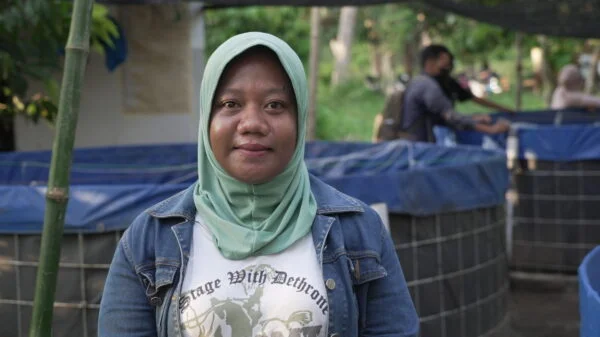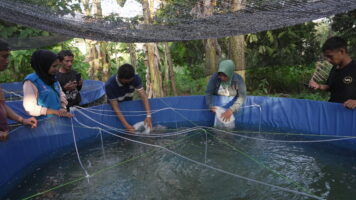
Dewi, a 28-year-old mother of 3, was one of many people whose lives were turned upside down when an earthquake and tsunami hit Indonesia’s Central Sulawesi province in 2018.
Dewi lost family members and her home in the disaster, which she still finds difficult to talk about. More than 4,000 people were killed, including hundreds who survived the initial disaster but were later caught up in related landslides, flash floods and major collapses of the soil.
Though still living in temporary accommodation, Dewi has begun rebuilding her life. She met Islamic Relief after a friend invited her to join a fish cultivation project in Petobo village.
The project was launched to support the recovery of communities affected by the disaster. It teaches new skills to those who have lost their livelihoods, enabling them to gain an income once more. It also contributes to food security in the area, where agricultural land was severely damaged by the disaster.
“Because of this project, I can develop a small business in Petobo. I know things will not be the same as they used to be. But, although we were hit by disaster, we want to carry on with our activities,” Dewi says.
“This fish farming programme makes a huge contribution to our village. Hopefully, it will become famous so that people know Islamic Relief helped us to create this.”
The project in Petobo is the first of its kind in Indonesia and has so far helped 25 people earn an income. As many families in the area are still living in temporary accommodation, the project runs from a communal area, where the fish are reared in large pools.
The flexible pools are designed to withstand earthquakes and be portable in the event that the community is uprooted by disaster.
“The purpose of this project is to motivate people to have the power to recover,” Ebhe, a livelihood assistant with Islamic Relief, explains.

“People were extremely down after the disaster. They had lost their livelihoods and were confused about how to make a living. Some of them also lost their jobs due to the pandemic. Islamic Relief being here can help them learn new skills.”
It is hoped that participants will be able to use the knowledge they’ve learned through the project to set up their own pools once they move into permanent homes.







